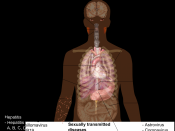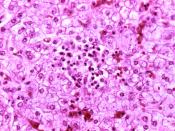Reye Syndrome is an extremely rare, non-contagious disease thought to be triggered by aspirin use. The actual origin of the disease is unknown. Reye's Syndrome, occasionally called Reye-Jacobsen's Syndrome, is known to follow any viral infection. Two of the most common viral infections it precedes is influenza, "the flu", and chicken pox. A now-familiar warning on bottles of aspirin, most notably Tylenol, is not to give Tylenol to a child who is recovering from the chicken pox, a fever, or any other viral infection. The link between aspirin and Reye's Syndrome and is not fully understood, but all reported cases of Reye's Syndrome include a child who has received aspirin before infection.
Symptoms of Reye's Syndrome may often be mistook for a recurrence of the flu, or extreme exhaustion. These symptoms include vomiting, confusion, lack of coordination, distorted balance, irritability, a stupor-like state, and a recent infection from a viral illness.
The symptoms often begin with vomiting and progress to a stupor and near comatose state. This disease is often found in young children and infants. Over sixty percent of reported Reye's Syndrome cases occur in children under the age of sixteen, with the majority of these cases being in children under six. Although less than five percent of Reye's Syndrome cases occur in people over the age of sixty, the elderly are often the most severely affected, due to old age and weakening immune systems. Infants, while hindered by their young age, can often fight the infections of Reye Syndrome better, for reasons doctors do not yet fully understand. The severity of Reye's Syndrome is classified on a scale of 1-5, with one and two being the onset of symptoms and four and five being the most severe, with the patient being comatose. With the most severe of Reye's...


